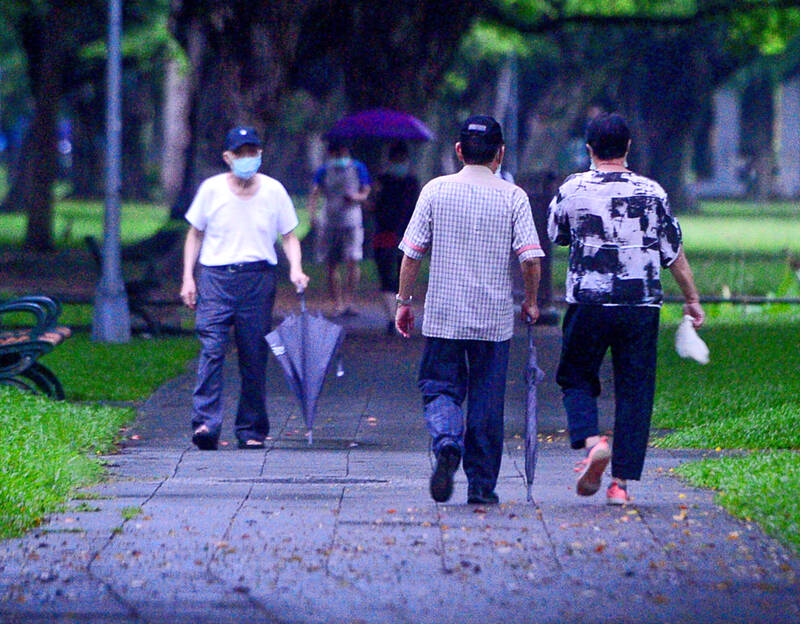The government aims to extend the average life expectancy by three years to 82 and reduce the average unhealthy period of one’s lifetime from 10 percent to 8 percent, or about 6.56 years, Premier Cho Jung-tai (卓榮泰) said at the Healthy Aging Forum in Taipei on Tuesday.
While average life expectancy in Taiwan is almost 80, Taiwanese spend an average of eight years in poor health, meaning that the average Taiwanese spends about 10 percent of their life unhealthy, bed-ridden or in need of care, Cho said.
The government’s medical expenses must increase dramatically if it is to increase life expectancy and the number of healthy years, he said.

Photo: Wang Yi-sung, Taipei Times
It must prepare long-term plans for medical and care services so that Taiwanese can enjoy a healthier and happier life in their later years, he said.
The goal is to reduce the stress on families and caregivers by ensuring that the public receives greater support, he said.
The Presidential Office established the Healthy Taiwan Promotion Committee to set essential milestones for achieving the national vision of a “healthy Taiwan,” he said.
The government is developing health policies, Cho said, giving the example of the 888 Program, which aims to admit 80 percent of patients with the “three hypers” — hyperlipidemia, hyperglycemia and hypertension — under care to ensure they are acclimated to medical consultations and have their conditions under control, Cho said.
The government’s cancer treatment and prevention policies, such as increasing rates of early-stage cancer screenings, targeted gene screenings and precision medicine, and the establishment of a new fund of NT$10 billion (US$304.3 million) to acquire new drugs for cancer treatment, aim to reduce cancer-induced mortality rates by one-third by 2030, he added.
The central government’s fiscal budget for this year grew by NT$280.6 billion compared with last year, much of which is due to increased funding for the National Health Insurance and other health-related programs, he said, urging legislators to be “rational” when reviewing the budget.
Cho said the forum is a significant event and thanked the American Chamber of Commerce in Taiwan (AmCham) for providing invaluable opinions on Taiwan’s economy, energy, agriculture, technology development and other fields.
The forum was held in Taipei and cohosted by AmCham and the American Institute in Taiwan.

ALL-IN-ONE: A company in Tainan and another in New Taipei City offer tours to China during which Taiwanese can apply for a Chinese ID card, the source said The National Immigration Agency and national security authorities have identified at least five companies that help Taiwanese apply for Chinese identification cards while traveling in China, a source said yesterday. The issue has garnered attention in the past few months after YouTuber “Pa Chiung” (八炯) said that there are companies in Taiwan that help Taiwanese apply for Chinese documents. Minister of the Interior Liu Shyh-fang (劉世芳) last week said that three to five public relations firms in southern and northern Taiwan have allegedly assisted Taiwanese in applying for Chinese ID cards and were under investigation for potential contraventions of the Act Governing

‘INVESTMENT’: Rubio and Arevalo said they discussed the value of democracy, and Rubio thanked the president for Guatemala’s strong diplomatic relationship with Taiwan Guatemalan President Bernardo Arevalo met with US Secretary of State Marco Rubio in Guatemala City on Wednesday where they signed a deal for Guatemala to accept migrants deported from the US, while Rubio commended Guatemala for its support for Taiwan and said the US would do all it can to facilitate greater Taiwanese investment in Guatemala. Under the migrant agreement announced by Arevalo, the deportees would be returned to their home countries at US expense. It is the second deportation deal that Rubio has reached during a Central America trip that has been focused mainly on immigration. Arevalo said his

‘SOVEREIGN AI’: As of Nov. 19 last year, Taiwan was globally ranked No. 11 for having computing power of 103 petaflops. The governments wants to achieve 1,200 by 2029 The government would intensify efforts to bolster its “Sovereign Artificial Intelligence [AI]” program by setting a goal of elevating the nation’s collective computing power in the public and private sectors to 1,200 peta floating points per second (petaflops) by 2029, the Executive Yuan said yesterday. The goal was set to fulfill President William Lai’s (賴清德) vision of turning Taiwan into an “AI island.” Sovereign AI refers to a nation’s capabilities to produce AI using its own infrastructure, data, workforce and business networks. One petaflop allows 1 trillion calculations per second. As of Nov. 19 last year, Taiwan was globally ranked No. 11 for

STAY WARM: Sixty-three nontraumatic incidents of OHCA were reported on Feb. 1, the most for a single day this year, the National Fire Agency said A total of 415 cases of out-of-hospital cardiac arrest (OHCA) occurred this month as of Saturday, data from the National Fire Agency showed as doctors advised people to stay warm amid cold weather, particularly people with cardiovascular disease. The Central Weather Administration yesterday issued a low temperature warning nationwide except for Penghu County, anticipating sustained lows of 10°C or a dip to below 6°C in Nantou, Yilan, Hualien and Taitung counties, as well as areas north of Yunlin County. The coldest temperature recorded in flat areas of Taiwan proper yesterday morning was 6.4°C in New Taipei City’s Shiding District (石碇). Sixty-three nontraumatic OHCA